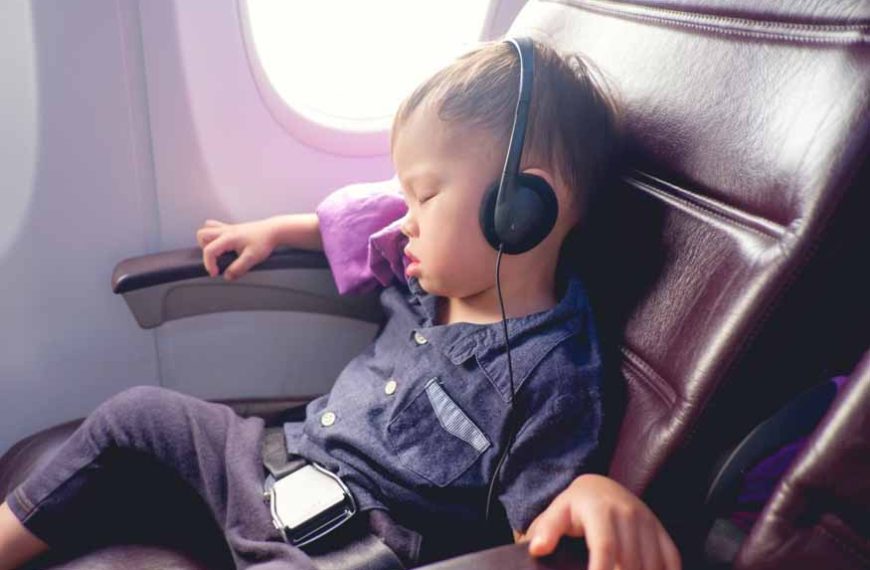Travelling may not affect the sleep of adults very drastically but babies and toddlers can definitely get thrown off balance. Flying after a family visit or a vacation can really jetlag your baby and upset their nighttime routine. This basically means that the sleep of the entire family is compromised.
Fortunately, there are a few ways to manage jet lag in babies and also ways to prevent it. That way nobody has to lose out on their precious holiday time or end up with frayed nerves thanks to a sleepless toddler. If your baby or toddler is experiencing jet lag, we have some tips for dealing with it so you can sleep. The good news is that jet lag or no jet lag, your baby will eventually sleep and so will you.
What is Jet Lag and Jet Lag Symptoms
Jet lag is extreme tiredness or a temporary sleep problem that occurs when someone travels across several time zones by plane. Your body has its internal clock, called circadian rhythms, which tell your body when to sleep and when to wake up. Your body’s internal clock is synced to the time zone of your place of departure. It takes time to change to the time zone of the place where you have travelled. That’s why, the more time zones you cross, the worse the jet lag is going to be.
Jet lag symptoms include not being able to fall asleep or waking up early, daytime fatigue, dullness, an unwell feeling, mood changes and stomach problems. Jet lag symptoms are temporary but can be very uncomfortable.
How Long Does Jet Lag Last in Babies
However agonising jet lag may seem, the good news is that it is temporary and usually lasts for just a few days in babies and toddlers. Their bodies soon adapt and they are back to normal.
For babies younger than 6 months, a few hours of time change will probably not cause any problems as they don’t have regular sleep cycles. If they do suffer from jet lag they are likely to get fussy or clingy.
A toddler may have a harder time adjusting if they miss their routine nap due to travel or if you try to make them sleep while it’s still light outside.
How to Overcome Jet Lag Quickly
The silver lining is that there are some tips by which a child should adjust to a time change in just a few days. Here’s how you can help your baby recover from jet lag.
- Go for Consistency
- Watch for Cues
- Spend Time in Sunlight
- Keep Active
- Don’t Turn on the Lights at Night
- Don’t Stay Hungry
- Be Patient
Babies and toddlers require a fixed bedtime routine, so don’t forget to carry whatever they are used to while sleeping. Whether it’s a stuffed toy, book or a lullaby you sing, it will signal to your child that it’s time to sleep. Even a crib sheet that your baby is familiar with, will calm them and help them to sleep.
Avoid letting your baby or toddler get overtired when dealing with jet lag and look out for sleepy signs like yawning, rubbing of eyes and fussing. Put them to bed so they can settle down in the crib and sleep.
Sunlight plays a vital role in resetting the body clock, so it’s a good idea to spend time in the sun when you arrive. It not only eases jet lag in toddlers but in adults too.
Staying awake and active during the day rather than sleeping because you are tired can help with jet lag. Take your kid to the park, pool or playground and let them move around so that they tire themselves out.
If your toddler wakes up in the middle of the night, keep them in bed and don’t switch on the lights. They may want to talk or play, but it’s best not to treat nighttime as daytime as it will make the adjustment all the more difficult. So, don’t give into the temptation of giving them snacks or letting them watch videos as they will enable your body’s clock to sync faster.
It will be very hard to get your toddlers to sleep if they are feeling hungry. Travelling can really throw your routine off track and a good way to get back to one’s routine is by having regular mealtimes and eating well. Keeping your toddler’s belly full does wonders in helping them transition back into their normal routine.
Jet lag takes time, so be patient and give your baby or toddler a few days to settle down. Try not to get impatient if they are a little cranky or clingy.
How to Avoid Jet Lag
It may not always be possible to prevent jet lag completely, but you can definitely lessen its impact. Here are a few steps to take so that your baby can get the better of jet lag.
- Decide Whether it’s Worth it
- Shift the Schedule Gradually
- Rest Well Before Departure
- Prefer Night Flights
- Give Yourself a Day On Return
If you are planning on a short trip of less than a week, ask yourself whether it’s worth upsetting your baby’s body clock and sleep schedule. As soon as your child gets used to the new time zone, it will be time to head back and once again get used to the old time zone.
Slowly start adjusting your child’s sleep schedule a few days before departure. Depending on the destination, shift their bedtime a bit earlier or later each evening.
This works best if there are only a few hours of time difference as you can shift their bedtime by 1 hour until they are on the new time. This will not work if there is a 15 hour time difference and you will just need to adjust as fast as you can on reaching.
Either way, try to make sure that your kid is as well-rested the week before the trip as possible so they are not cranky and in a bad mood when the jet lag hits.
Ensure that your baby or toddler is well-rested before their journey. Being tired right at the start will only make jet lag worse.
Depending on where you are travelling to, evening or night flights can be preferable. Even if your child doesn’t sleep during the flight, they will be tired enough to sleep on reaching.
Once you have reached your destination, it’s time to let their body start adjusting to the time. The thing that works best is to keep them on the current time as much as possible but also let them rest in a way their body clock is used to at first. This will prevent them from getting overtired and sleep-deprived and they will get into their new routine faster.
Travelling with your kids can be great fun but it’s also a lot of work helping them recover from jet lag. Once you have decided to take your kids on your travels, there are a few steps you can take to guide you in making the transition easier. If you need more information on travelling with kids check out EuroKids to get the latest updates.















